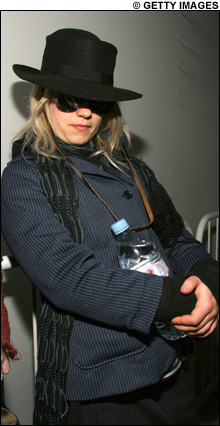Recent revelations about fictitious memoirs have exposed our society’s lust for stories about savaging helpless children
 Not to be outdone by recent Beltway-corruption scandals, the ordinarily more-subdued literary world found itself two weeks ago grappling with its own grim little fraud. On January 8, TheSmokingGun.com ran a lengthy exposé of the massive exaggerations and outright lies in James Frey’s Oprah-promoted, drugs-and-alcohol-drenched memoir A Million Little Pieces. Then, on January 9, the New York Times reported that J.T. LeRoy — author of the 2000 autobiographical cult novel Sarah, about a sexually abused transgender teen with AIDS, and the 2001 autobiographical story collection The Heart is Deceitful Above All Things — didn’t exist. Or rather, the person who has been appearing at readings as “J.T. LeRoy” is really a San Francisco–based woman named Savannah Knoop. It is still unclear who wrote the books, but most probably it was Laura Albert, the partner of Knoop’s half-brother Geoffrey.
Not to be outdone by recent Beltway-corruption scandals, the ordinarily more-subdued literary world found itself two weeks ago grappling with its own grim little fraud. On January 8, TheSmokingGun.com ran a lengthy exposé of the massive exaggerations and outright lies in James Frey’s Oprah-promoted, drugs-and-alcohol-drenched memoir A Million Little Pieces. Then, on January 9, the New York Times reported that J.T. LeRoy — author of the 2000 autobiographical cult novel Sarah, about a sexually abused transgender teen with AIDS, and the 2001 autobiographical story collection The Heart is Deceitful Above All Things — didn’t exist. Or rather, the person who has been appearing at readings as “J.T. LeRoy” is really a San Francisco–based woman named Savannah Knoop. It is still unclear who wrote the books, but most probably it was Laura Albert, the partner of Knoop’s half-brother Geoffrey.
While national news and op-ed columns have been filled with harsh dissections of James Frey’s fictional embellishments — since its original story the Times has run 17 news, feature, and op-ed pieces on the subject — the J.T. LeRoy story has received far less attention. And when it has, the LeRoy scam hasn’t been taken very seriously. Indeed, in a Sunday, January 15, Times op-ed, memoirist Mary Karr lambasted Frey as a mendacious “skunk” fouling the literary waters, but found J.T. LeRoy to be a “fine little prankster.” The discrepancy can be attributed simply to scale: in contrast with Frey, who launched a big-bucks-bestseller scandal, LeRoy — although championed by glitterati (Courtney Love) and writers (Mary Gaitskill) alike — engaged in nothing more than penny-ante grifting. Whatever the explanation, everyone seems to have missed the important story here: in a monstrous act of literary sadomasochism, J.T. LeRoy published emotional pornography that features implausibly sick-and-dying, destitute, sexually abused teens. What’s more, readers have been lapping it up.
Damaged goods
Few have made the obvious connection between J.T. LeRoy’s masquerade as a gay kid dying of AIDS and Anthony Godby Johnson’s 1993 AIDS memoir A Rock and a Hard Place. In that literary scandal, the book’s author — supposedly a 14-year-old boy dying of AIDS, but actually, according to a November 6, 2001, article in the New Yorker by Tad Friend, a woman named Vicky Johnson who later claimed to be “Anthony’s” adoptive mother — wrote about his childhood of horrific sexual abuse. With that in mind, LeRoy’s abject literary hoax looks like a copycat crime, mimicking not just the sexually lurid, damaged-child motif of Johnson’s book but its promotional strategy as well.
The similarities between the two cases are remarkable. “Johnson” befriended — by phone, no one ever met him — a host of literary stars such as National Book Award winner Paul Monette, who encouraged his writing, and Fred Rogers of Mr. Rogers’ Neighborhood, who wrote an afterword for A Rock and a Hard Place. He also befriended San Francisco writer Armistead Maupin, author of Tales of the City. (After realizing he had been bamboozled for several years, Maupin penned The Night Listener, a fictional version of his experience with Anthony Godby Johnson, which has been made into a film that premiered just last week.) Similarly, LeRoy — calling himself Terminator and presenting himself as a homeless gay-teen hustler — cultivated friendships with writers such as Dennis Cooper and Bruce Benderson, whose connections he then used to get published. Once published, both frauds moved on to more lucrative gigs. Johnson was contracted for an HBO film, though it later fell through. LeRoy sold a film project based on The Heart is Deceitful (which was made in 2004 and is scheduled for US release in spring of this year) and served as co-producer of Gus Van Sant’s 2005 Elephant. He also did commentary on the Criterion Collection’s DVD of Van Sant’s My Own Private Idaho and has written for the New York Times, the London Times, and a host of literary and film magazines.
The audacity of these impersonations is astounding. But even more audacious was the sheer effrontery of inventing, and using for self-promotion and financial gain, the allegedly real identities of children or teens who had been abused, hurt, molested, disabled, diseased, and physically and spiritually ransacked.
It is no surprise that readers — even smart, astute readers such as Mary Gaitskill and Armistead Maupin — would respond so immediately to both the authors of these autobiographical works as well as to the writing itself. This is potent stuff, and the writers of A Rock and a Hard Place and The Heart is Deceitful Above All Things abused their position and power as writers when they started trafficking in the overt, self-serving lie that these narrators were actual hurt children living in unimaginable physical and psychic pain.